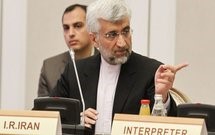 A reported U.S. offer to roll back sanctions against Iran suggests a shift in the talks surrounding Tehran's nuclear program. For almost 10 years, the negotiations surrounding the Iranian nuclear issue have failed to make any headway. But the latest round of talks points to a faint possibility of a break in the nearly decadelong trend of periodic, dead-end talks.
A reported U.S. offer to roll back sanctions against Iran suggests a shift in the talks surrounding Tehran's nuclear program. For almost 10 years, the negotiations surrounding the Iranian nuclear issue have failed to make any headway. But the latest round of talks points to a faint possibility of a break in the nearly decadelong trend of periodic, dead-end talks.
For the first time since the Iranian nuclear controversy began in 2002, the United States and its Western allies reportedly have publicly offered to lift some trade sanctions (though not the ones targeting Iran's oil and financial sectors) in exchange for Iran suspending enrichment and providing transparency into its nuclear program.
The Iranians have expressed an unusual level of optimism after the talks in Almaty over the past 48 hours. Iranian Foreign Minister Ali Akbar Salehi reportedly said he was "very confident" that an agreement could be reached. Moreover, Tehran's National Security chief Saeed Jalili described the meeting in the Kazakhstan capital as a "turning point," adding that the latest offer from the West was more realistic than previous offers and was closer to the Iranian views in some cases. On the other side, U.S. Secretary of State John Kerry reportedly described the Almaty talks as "useful," saying that a serious engagement by Iran could lead to a comprehensive deal.
The last time there was an agreement on the Iranian nuclear issue was in December 2003, during Mohammed Khatami's presidency, when Tehran signed the Additional Protocol to its Nuclear Non-Proliferation Treaty Safeguards Agreement, granting International Atomic Energy Agency inspectors expanded inspections of the country's nuclear program and temporary suspension of uranium enrichment, which at the time was 5 percent. After current President Mahmoud Ahmadinejad was elected to his first term two years later, the Islamic republic ended the voluntary implementation of the Additional Protocol in response to the West's shift from asking for temporary suspension of uranium enrichment to requesting Iran abandon it all together.
A lot has changed since then, but years of talks have led nowhere. In addition to removing some trade sanctions, the latest offer would allow Iran to keep some of the enriched uranium to fuel a medical research reactor in Tehran. Furthermore, the new offer reportedly no longer seeks a full shutdown of the underground Fordow nuclear facility (a key demand until recently); rather it is asking for a temporary cessation of its operations.
Iran, however, is insisting on international recognition of its sovereign right as a signatory of the Nuclear Non-Proliferation Treaty to continue enriching uranium at 20 percent, which the other side is unwilling to accept. The key question here is why the West has now offered these concessions.
First, the latest round of sanctions that undermined Iran's crude export capabilities have ultimately allowed the United States to move into a position of relative strength in negotiations. Washington realizes that sustaining these sanctions over the long term will be problematic and that it needs to try to reach a settlement while it has the upper hand. Second, the United States wants to limit Iran's uranium enrichment levels, which Tehran has increased from 5 to 20 percent. Third, Iran could undermine U.S. interests in the Middle East and South Asia, and Washington is hoping that diplomacy could yield an understanding, as was the case when the two sides collaborated in U.S. moves to affect regime change in Afghanistan and Iraq.
Given the complexity of issues that must be dealt with, there is a high probability that the latest initiative could also fall apart. At the very least, it is extremely difficult to arrive at an arrangement that would accept Iran's harnessing of nuclear technology and at the same time prevent Tehran from putting this technology toward military use. That being the case, there has been a major development in terms of U.S. willingness to roll back some sanctions (something the Iranians have long been demanding and the West has until now been refusing), which cannot simply be dismissed as business as usual.
Courtesy : Stratfor (www.stratfor.com)